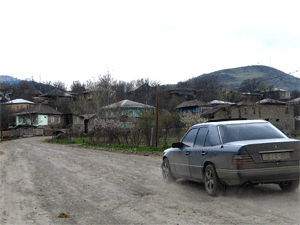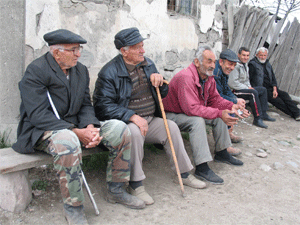Special Reportage
 The village of Arali in the Adigeni Dsitrict is 17 kilometers away from Akhaltsikhe and 19 kilometers away from Adigeni. The village altitude is 1120 meters and is situated on the embankment of the Kvabliani River.
The village of Arali in the Adigeni Dsitrict is 17 kilometers away from Akhaltsikhe and 19 kilometers away from Adigeni. The village altitude is 1120 meters and is situated on the embankment of the Kvabliani River.
In the past there used to be seven villages on the area. Arali was built on the ruins of those ancient villages and the locals have two versions about the origin of the name. One version states that the name comes from the Goddess of Productivity “Harale’; another version says that the name of “Arale” means remote place.
Most villagers are Catholic. There are ruins of many churches in the village but only one little Catholic Church is active.
The list of village problems is too long. The destroyed road, bad water supply, unemployment, useless and abandoned House of Culture, locked library, uncultivated lands and expensive life…
There are mostly two-storied houses in the village. Many of them are not built to the end. But several of them are abandoned. Locals state that the empty village is a result of hard social-economical life.
“The villagers keep their families by agriculture and gardening. We used to reap rich harvest in the past and we lived well-off. Now we cannot get anything, consequently people do not want to stay here. I have three children and none of them are going to stay here. In the future my house will get as abandoned as many others in this village,” said Ana Matoshvili.
Arali is a densely-populated village with little land. Because of increased price on fuel people cannot cultivate their plots. Ioseb Kachkachashvili, a teacher of Russian language and the leader of the Arali branch of the National Movement, member of the District Municipality, spoke about the problems in the village.
“The village has problems about irrigation system and the drinking water. The banks of the river should be repaired; the village is in continuous danger of flooding their plots near the river bank. The people can hardly bring harvest but they cannot sell even that small number of harvest they reap because there is no market nearby. If they somehow manage to sell their product it is too cheap.”
 The old people miss old time.
The old people miss old time.
“We lived better in the past. People worked and received enough salaries and pensions. Nowadays, our pensions are not enough for bills,” sixty-five-year-old Stephane Afriamashvili cannot help his sorrow.
The House of Culture in the village is empty and cracked down. It does not have any glasses either. There are statues to Lado Ketskhoveli and Stalini in the yard. There is also a memorial to the victims of the Great Patriotic War in the yard.
There used to be a collective farm after Lado Ketskhoveli in the village. Those statues are pale memories from the past.
“Goals can be achieved by hard effort. If they wish to remove the statues we will not resist them. But why should they? Ketskhoveli and Stalini did only good deeds to people,” said the elderly people.
There used to be a village council, library and musical school in the building of the House of Culture.
The village council does not function now. The library is closed; several thousands of books do not have caretaker. “They say that books are not necessary any more and internet should replace them. But who can say when internet will enter Arali?” said the villages in sorrow.
The voice of the piano is coming from the depth of the room. It seems the music school is till working.
Six teachers, who have been working on enthusiasm since January 2007, give lessons in three rooms only.
“We have three pianos; they are old but still work. In the past we had eighty pupils. We have increased the tuition fee from 8 to 13 lari. So most of them could not afford the fee and gave up lessons,” said Lia Janashvili, music teacher.
The nursery school is in better conditions than any other buildings in the village. The building is newly reconstructed with nice bed-rooms, kitchen and a toilet.
“We have twenty-five children. Parents pay ten lari a month. We feed them twice a day and the food is nice. The clergymen aided us and brought a lot of toys from Italy,” said Tsiala Kalandia-Kachkachishvili, the teacher.
There is one secondary school in the village. 320 pupils learned there two years ago. Now their number is reduced to 240.
School teachers are grateful to the international organization “Care” and BP Company who reconstructed the school in 2002; however, they point out that the school still faces many problems.
“The windows were changed, the parquet on the ground floor was changed and “Care” presented us with three computers. However, we do not have enough classrooms and the tutorial process is going on in two shifts. We do not have a gym. We use the hall of the House of Culture for some events.”
The average length of life is 68-70 years. There is a medical auto-patient in the village where villagers are provided with first aid.
“Old people with hypertonic and heart ischemias visit us very often. With the approach of spring the number of allergy cases increased. We have many occasions of endocrine diseases, like goiter. The birth-rate is too low. In the past time nearly 50-60 children were born in a year; but this year not more than 8-9 children will come to life this year,” said therapist Gulnaz Kachkachishvili, director of the out-patient.
The villagers complain about inattention and expensive life.
“In the past we could take a notice for free at our village. Now I have to go to Adigeni for it and I have to pay 30 lari for one sheet of paper. Could it be so? Where can people get the money from?” said Ioseb Kachkachishvili.
The villagers hope the future will be better. They have many wishes though they are not sure their dreams will ever come true.
The retired people expect increased pensions, teachers and medical personnel expect increased salaries. The music teachers hope to receive their frozen salaries for four-month. The pupils are dreaming about a new playground. The peasants are looking in the sky and hope that “the nature will support them to receive rich harvest.”
Gulo Kokhodze, Adigeni
News
December 13, 2023
Ethnic minorities outside the peace dialogue
November 6, 2023
‘Peace’ agenda of political parties
Popular
Articles
February 13, 2024



